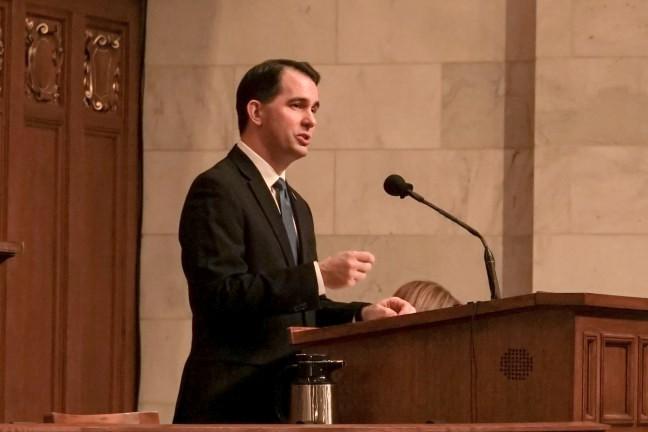Though the 2016 election ended only months ago, many politicians are already preparing for the upcoming midterms. In 2018, Wisconsinites will vote for governor and U.S. Senate.
It looks like both incumbents — Republican Gov. Scott Walker and Democrat Sen. Tammy Baldwin — plan to run for re-election, meaning challengers have to begin now to amass financial and popular support.
Even though we are far from November 2018, there are some early indicators Republicans are far more confident than Democrats when it comes to these races. It seems Wisconsin Democrats are still suffering from shell shock following President Donald Trump’s victory in the Badger State. Low morale within the party has seemingly deterred Democrats from challenging Walker while encouraging Republicans to target Baldwin.
Consider the last two Democratic nominees for governor. Milwaukee Mayor Tom Barrett has been in politics for a long time, and no one doubts his experience. Barrett was the Democratic nominee twice, in 2010 and in 2012 for the recall. He failed twice, likely because it was far too easy to point to the dismal economic situation in Milwaukee as evidence of his incompetence.
Secondly, he had no outside appeal from a traditional liberal base. Part of the reason Walker excelled was because he ran liberal Milwaukee County for many years and his connections in many suburbs in southeastern Wisconsin propelled him to victory.
Former gubernatorial candidate Mary Burke, who ran in 2014, is sort of the opposite of Barrett. She has spent most of her time in the private sector and was virtually unknown when she ran for office. There was a real opportunity because Democrats could frame their own image of her. But picking someone who is relatively unknown can be highly risky.
Like Barrett, Burke had no major outside appeal from Dane County. In fact, she lost votes in Milwaukee that Barrett had won even though she improved in Madison.
So who are Walker’s Democratic potential challengers?
First, there’s Mark Bakken. When I think of Bakken, I instantly am reminded of Burke. Like her, he’s a businessman who has been unknown thus far when it comes to politics. But, perhaps remembering what happened in 2014, Bakken recently opted not to run, deciding he would prefer to stay at his business.
Then there’s state Sen. Tim Cullen, D-Janesville, a former state Senate majority leader. He briefly considered running against Walker in 2018, but now he’s out. He claimed he wasn’t a big fan of the fundraising calls that would have been needed to form a sufficient campaign. Even though Cullen came from somewhere out of the Milwaukee and Madison bubbles, the fact he was disinterested in raising money would have hurt him. And at 73 years old, his age could have also been a factor.
Another supposed option was former Green Bay Packer and current ESPN radio show host Mark Tauscher, but he shut down any rumors about his potential interest in the gubernatorial sweepstakes, and confirmed the “Mark Tauscher for WI Governor” Facebook page is not affiliated with him.
Walker will face a Democratic opponent in 2018, but the lack of interest among many shows that he’s in a strong position for re-election.
As for Republicans challenging Baldwin, the story is entirely different. Several Republicans are eager to run in 2018. It’s easy to see why they’d want to. If Republicans in Wisconsin can win at the presidential level for the first time since 1984, then midterm elections should be no trouble. That being said, Baldwin does have a conventional advantage. More often than not, the opposition party wins in midterm races.
As the process to approve a state budget moves forward, many legislators are quite busy at the moment. There are two who have said they are considering challenging Baldwin. In the state Senate, Assistant Majority Leader Sen. Leah Vukmir, has said that she might run. The Brookfield Republican has been in the state Legislature since 2003 and has a lot of experience that can be used just as effectively in the U.S. Senate.
Another Brookfield Republican, state Rep. Dale Kooyenga, claimed he’s open to the possibility of running, but is currently focused on the state budget. He hasn’t been in office as long as Vukmir, but he has been a champion of major reforms and a veteran, which could give him large appeal across the state.
There’s three potential candidates who aren’t in politics. Eric Hovde, a Madison businessman, almost won the 2012 Republican primary for U.S. Senate. This sort of makes him the runner-up against Baldwin and no one doubts he has the money to spend.
There are two other outsiders. One is Nicole Schneider of Green Bay, whose father-in-law built Schneider National. Schneider National is planning on going public, resulting in $230 million for the family. This would certainly give her the funds for a campaign.
Another is veteran and businessman Kevin Nicholson of Delafield. Initial concerns the Republican would lack funds have disappeared. He is receiving strong support from GOP donor Richard Uihlein, who has donated $2 million to the new super PAC “Solutions for Wisconsin.”
The contrasts between the two fields of candidates are stark, but they tell a clear story about politics in Wisconsin. Republicans are stronger, more popular, have wider wallets and are significantly more excited about 2018. On the other side of the aisle, the Democrats are worried and lack optimism. This paves the way for more GOP victories in the Badger State.


